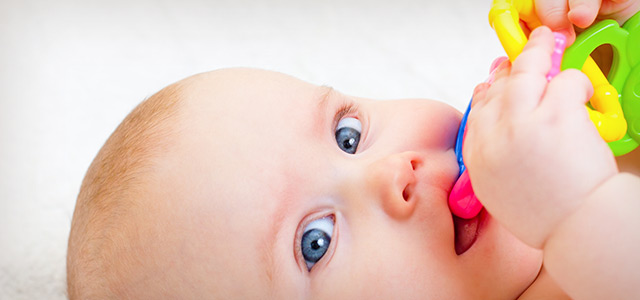At about six or seven months of age, the baby of your dreams, the one who makes you smile and go all goo-goo-ga-ga, is likely going to do a full 180 on you and turn into a biting, drooling, screaming machine … or, at least, a crying/whining one. The most frequent reason for this change in behavior is quite often, you guessed it – teething. So, for those parents who haven’t yet gone through this uncomfortable growth stage, let’s walk you through three of the most common symptoms you’re likely to deal with when the tooth monster finally appears.
- Excessive Drooling: The first noticeable sign your baby’s mouth is starting to develop teeth, is an excess of saliva production. Most times you’ll be around to notice the stream of saliva leaking from the corners of their mouth, or you’ll notice a wet spot on the bedspread near their head, or on their clothing just below their neck when you visit in the morning. There are a few ways to deal with the drool monster. When you’re present, keep something nearby that will allow you to keep your baby’s mouth and chin saliva-free. It will be an all day battle, so be ready for it. Also, outfitting them with a bib will help you catch the messes you miss, and prevent chapped skin caused by the air-drying of saliva on the face.
- Chewing, Biting, Gnawing: When your baby’s teeth begin to come in, they’ll start to realize that they can ease their discomfort by snacking on anything from your finger to spoons to furniture. So, unless you enjoy having your fingers chomped on, you’ll want to give your child something else to bite into. Parents swear by a myriad of devices, and the ones that come up over and over again are popsicles, a partially frozen wet towel, and any solid chew toy your child might take to that you’ve stuck in the freezer for a while – again, not rock hard, just cold. It’s also generally recommended that one stay away from the liquid-filled ones in case they were to break.
- Lotsa’ Crying and Whining: If you think about the idea of a hard tooth making its way through closed gum tissue, you’ll have a good picture as to why teething tends to make babies cry … it hurts! Doctors also believe infants cry because they’re just frustrated that the pain won’t go away. Imagine a headache that lasted for weeks – with no end to the misery in sight, you would tend to get pretty frustrated as well. Dealing with a crying baby is never easy, and you’ll champion your own methods over time. One quick tip that might help: remain calm. Calmness is an energy that can be seen and felt just as well as anger, fear and happiness. So, if you’re nervous or anxious about your baby’s crying, take a break … and take a breath. And then, deal with the situation at hand. You’ll feel better, and so will your child.
Teething is something every child and parent has to deal with together. It’s a true test of teamwork and fortitude. Every child is different, and you’ll figure out what works for you over time. And frankly, you might have plenty of time to figure things out since teething can last up to a year or more! Ask your friends, ask your family, and ask your dentist for help, and rest assured that while arduous, teething will not last forever!

